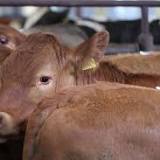66-million-year-old fossil dinosaur embryo found in China

 The embryo was in a coiled position known as folding
The embryo was in a coiled position known as folding Chinese researchers have found a perfectly preserved dinosaur embryo. The egg was in all likelihood preserved by a sudden landslide that buried it, according to scientists. The discovery is also said to shed some light on the link between modern birds and dinosaurs.
The perfectly preserved embryo retrieved in Ganzhou, a city in southern China, was preparing to be born, just as animals such as chickens do. Researchers estimate the sample to be at least 66 million years old and to have belonged to a toothless theropod dinosaur or an ovirraptosaurus. Experts have called him Baby Yingliang.
The egg was discovered in 2000, but it was stored for years. It was only when construction work began at the museum and the ancient fossils were classified and researchers turned their attention to the egg, which they suspected contained an embryo inside.
Fion Waisum Ma, one of the scientists involved in the discovery, said it was the best dinosaur embryo ever found. The discovery has also given researchers a greater understanding of the link between dinosaurs and modern birds. The embryo was in a coiled position known as folding, which is a behavior seen in birds shortly before they hatch.
This indicates that such behavior in modern birds evolved and originated for the first time among their dinosaur ancestors, Ma told AFP.
This is part of an embryo's coordinated dance to prepare itself to break through its egg and enter the world. Tucking is essential for a successful hatch.
Ovirraptorosaurs, which means egg-thieving lizards, were feathered dinosaurs that lived in what is now Asia and North America during the late Cretaceous period, about 100 to 66 million years ago.
Baby Yingliang is 27 cm long from head to tail and rests inside a 17 cm long egg found in the Yingliang Stone Museum of Natural History in China.
Part of the dinosaur's body is still covered in rocks, and researchers will use advanced scanning techniques to create an image of its full skeleton.


 United Kingdom
United Kingdom Argentina
Argentina  Australia
Australia  Austria
Austria  Brazil
Brazil  Canada
Canada  Germany
Germany  Ireland
Ireland  Italy
Italy  Malaysia
Malaysia  Mexico
Mexico  New Zealand
New Zealand  Poland
Poland  South Africa
South Africa  United States
United States 
















